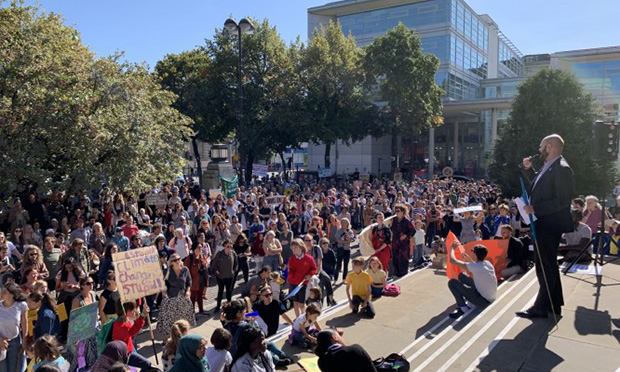Plans for citizens’ assembly on climate change to be developed this summer, pledges Hackney Mayor

Hackney Mayor Philip Glanville has confirmed that his administration will spend the summer planning a citizens’ assembly on climate change.
As part of its declaration of a climate emergency in 2019, in which the Town Hall set a target of achieving net zero emissions by 2040, ten years earlier than central government, the council also promised to conduct an annual citizens’ assembly.
It would see “a representative group of local residents” tasked with publicly scrutinising the council’s progress and exploring solutions to the challenges posed by climate change.
Responding to questioning from Hackney Green Party’s Reiner Tegtmeyer on the timeline and potential permanent future role for such a body, the borough leader explained that the general election build-up in 2019 followed by the pandemic had prevented it being formed.
Glanville also hinted that “on some forms of emissions and net zero”, the target date could even be moved to sooner than 2040.
He said: “Lambeth are doing their citizens’ assembly in the coming days. I’m keen to see how that works – I’m assuming it’s online – and making sure that we build something that works in person .
“We’re committed to making sure there is a range of voices, reflecting the demography and makeup of Hackney. That does not mean we turn our back on activists and organised groups – we want to make sure they are fully involved as well, and we will always seek to engage with them.”
He added that he, along with council officers and a new cabinet member, will use the summer “to frame what the citizens’ assembly will look like”.
The borough leader said that while he is “captivated” by the model of Camden’s citizens’ assembly, which changed the council’s constitution, having the assembly continue as a permanent group was not for him, but for citizens themselves to determine.
In Camden’s 2019 assembly, 49 assembly members developed 17 ideas on reducing carbon emissions across the home, neighbourhood and council levels, including the establishment of a climate emergency scrutiny panel made up of both experts and residents, and for all new homes to be zero carbon.
Lambeth Council is funding an independent assembly until 3 July this year, bringing together 50 people both randomly selected and representative of the population, which is designed to produce a collective response from residents to the climate emergency.
Glanville added: “Inevitably, going into 2022 elections, there will be a range of offers from political parties and civic society on what the next four years will look like.
“Let’s get our first one done outside of that pure political period and let that assembly set the agenda that political parties and myself then have to rise to.
“Hopefully then we will have a four-year structure that holds us to account on this journey to net zero that we know is absolutely vital for the future of the borough and the future of the planet.”
